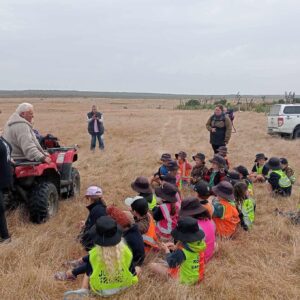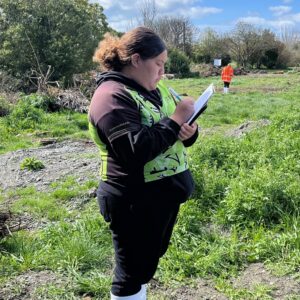The Active Hub Whānau Day held in term 3, 2022 was the result of the school, with a roll of just 74 and an average attendance of 50, recognising the power of collaborating with its community. Like many schools across the motu, the school has felt the impact of COVID and has been forced to think outside the box to overcome a number of challenges – most notably student engagement and attendance.
It has also been struggling to connect with whānau which, for teacher Karina Ngarangione-Wicks, is key to supporting tamariki wellbeing. She says tamariki will be more engaged if they, and their whānau, feel safe and appreciated.
“You can’t really push all this other learning on them until they have a sense of belonging and a sense of identity. There is no point in pushing, pushing, pushing all this academic stuff if we haven’t got those connections, haven’t built those relationships,” Karina says.
“That was, okay, we need to think out of the box. We need to think outside of the square. We’ve got to think about how we can connect with these kids.”
So recognising the need to awhi whānau, and connect them with wellbeing providers in the community, the idea for an Active Hub afternoon was born.
“You can’t really push all this other learning on them until they have a sense of belonging and a sense of identity.”
The school pitched their idea to Sport Hawkes Bay Healthy Active Learning advisor Sally McKenzie. Healthy Active Learning is the joint government initiative supporting schools to create quality physical activity and kai environments and better connections to their communities. Sally, who has been working closely with the school, took the idea back to her colleagues at the Hawkes Bay Health and Wellbeing Partnership Group. The group, which is responsible for guiding health and wellbeing initiatives in the area, drew on their community connections to further support the day. That included the New Zealand Defence force agreeing to fly in a helicopter to kick-start the day.

In the end, the event saw 57 students and 80 whānau members joined by representatives of more than 20 community health and physical activity providers for an afternoon of physical activity, sharing kai and connecting. Tamariki and whānau spent the afternoon on a bouncy castle endurance race, at the play trailer, biking, playing rugby, scooter and basketball as they also got to know police officers, army people and firefighters kanohi ki te kanohi. There was also a kai element, with whānau taking away try-at-home recipe bags for butter chicken (including veges from the school’s garden).
“If we can do things that tap into more of that wellbeing, whānau, collective space then that’s going to be key.”
The mantra of the day became “you can’t be what you can’t see” – an opportunity for tamariki to be exposed to pathways they might not have considered, and Sally says the day has also inspired discussions about similar events in other schools.
“For these young tamariki to see their role models being active and then to have their whānau there being active with them was just absolutely gold. If we can do things that tap into more of that wellbeing, whānau, collective space then that’s going to be key.”
The day was a huge highlight for everyone, including the two daughters of parent Christine Nopera-Ruru.
“My babies came home talking about the whole day especially the army people and the wakatopatopa.”
A proud past-student herself, Christine says the day was awesome and she hopes it will happen again.
Constable Duane Coffin agrees that the day set a precedent for working collaboratively as a community. For him and his team, the chance to connect with whānau and tamariki in a positive environment provided a rare opportunity which he hopes to have more of.
“It empowered all of us, and the families, tamariki and especially staff who work in a challenging school. It’s not often that they get wins on the board,” he says.
Karina says the chance to meet and collaborate with other people in the community who are passionate about tamariki wellbeing was inspiring.
“It was really nice to meet all of these different, wonderful people that had strengths within the community and hear what they do and then work together to come up with all these ideas.”
Most significantly though, she says the day has allowed her to build new, lasting, relationships with whānau.
“I now have four of my whānau on easy speed dial. It’s cool. It really helped me to connect.”






